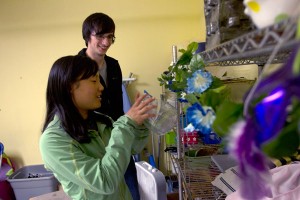Ithaca College promotes itself as sustainably conscious and is continuously listed as a top sustainable college. But colleges like Dartmouth and Oberlin surpass the college on campus sustainability lists. One factor may be that their efforts are concentrated in a centralized Office of Sustainability.

At Ithaca, staff, student interns and other members of the college community who work on sustainability projects are dispersed across campus.
Marian Brown, special assistant to the provost for sustainability, works with the administration on sustainability education and outreach on campus. She said there has been no movement to combine staff and projects across campus into one overarching Office of Sustainability, but an office could strengthen the campus’ sustainability image.
“It would be nice to be in a more visible location so if somebody from [the community] or a donor comes on campus for an event, or a student tour with prospective students were to come walking through they could see an Office of Sustainability,” Brown said.
The college has continued to gain more employees dedicated to the expansion of sustainability on campus. In 2006, president emeritus Peggy Ryan Williams signed the Talloires Declaration, a pledge of commitment to a sustainable future. The Ithaca College Climate Action Plan was approved in the fall of 2009 and began the college’s 40-year plan to become carbon-neutral by 2050.
“It’s becoming more of a question as we get, frankly, more sustainability folks working on this,” Brown said. “We’re now up to four that basically have a relatively full-time focus on sustainability efforts.”
Brown said while there are four staff that officially focus on sustainability, there are other staff working on initiatives throughout campus.
Oberlin College, a small private institution in Ohio with sustainability efforts similar to the college, has an established Office of
Environmental Sustainability, and the University of Rochester has a Council on Sustainability to help guide the university’s initiatives.
Brown said one aspect of the college’s expanding sustainability initiative is to have more sustainability coordinators in different departments across campus working to bring them to a higher level of environmental consciousness.
While Brown works with the Office of the Provost, some employees are supported by outside forces like Sodexo, the company contracted by the college for dining services. Sodexo is the direct employer of Stephanie Piech, the sustainability coordinator for Ithaca Dining Services.
She said her job is divided between Sodexo and Ithaca Dining Services, and collaboration with other campus employees.
“[Eco] rep students do a lot of education about composting in the dining halls or in dining areas, and even if I just wanted to connect with one of them … email isn’t the easiest thing,” Piech said.
The college’s Eco-Reps program was established last year and is modeled after the University of Vermont. Its aim is to promote sustainable behaviors in residence halls through peer-to-peer education, senior Margaret Keating said.
“[We’re] peer-to-peer mentors, or resources for people who live on campus,” she said.
Keating is one of 14 student eco-reps paid by the college to carry out this mission.
Keating and the other eco-reps work under the Resource and Environmental Management Program, a division of the Office of Facilities.
Mark Darling, one of the college’s four official sustainability employees, coordinates the reps.
Darling leads the college’s sustainability efforts that pertain to operations on campus.
“There would definitely be an advantage of having everyone who’s working on sustainability housed together,” Darling said. “But I’m not sure about whether having them all report to one office, that reports to one vice president or to the president, would necessarily make it any more effective.”
Brown said the administration’s goal is to bring the college as a whole to a more sustainable state.
“Our objective is to get the entire campus to think about making more sustainable decisions,” she said. “So does that require a single entity to do that?”
Brown said she questioned whether an Office of Sustainability would actually be productive.
But, an actual location that housed all sustainability projects would be helpful for campus visitors and members of the campus community, she said.
“It could be valuable to the institution,” she said. “To our function, it probably doesn’t mean a hill of beans of difference.”







